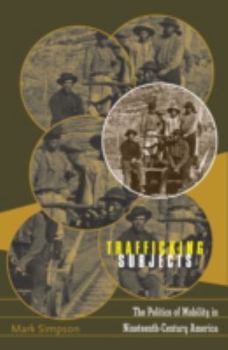Trafficking Subjects: The Politics of Mobility in Nineteenth-Century America
Select Format
Select Condition 
Book Overview
Redefines travel in the United States during the antebellum, postbellum, and early modernist periods In America, travel has regularly been associated with romantic notions of freedom, exploration, and possibility. Focusing on a broad range of movement in the nineteenth century, Trafficking Subjects challenges this conventional view, demonstrating the complexity of the politics of mobility in American culture. The texts that Mark Simpson consults are drawn from a wide range of genres and foreground social and cultural phenomena from slave revolt to fugitive escape, imperial expedition to neocolonial tourism, and market circulation to tramping protest. Utilizing works as diverse as Gray's The Confessions of Nat Turner and London's Martin Eden, Poe's The Narrative of Arthur Gordon Pym and Edmonds's Nurse and Spy in the Union Army, Simpson traces the vexed dynamics of movement and its representation in the nineteenth-century United States, developing a theory of mobility as social contest. Questions of national subjectivity and belonging, especially as inflected by race, gender, and social class, bear centrally on his analysis of how mobility as a social and cultural resource comes to be distributed, invested, directed, and determined. Trafficking Subjects helps us to see what it can mean to become subject to America, in all the conflicted senses of that phrase.
Format:Hardcover
Language:English
ISBN:0816641625
ISBN13:9780816641628
Release Date:December 2004
Publisher:University of Minnesota Press
Length:232 Pages
Weight:0.93 lbs.
Dimensions:0.7" x 6.1" x 9.3"
Related Subjects
HistoryCustomer Reviews
0 rating





